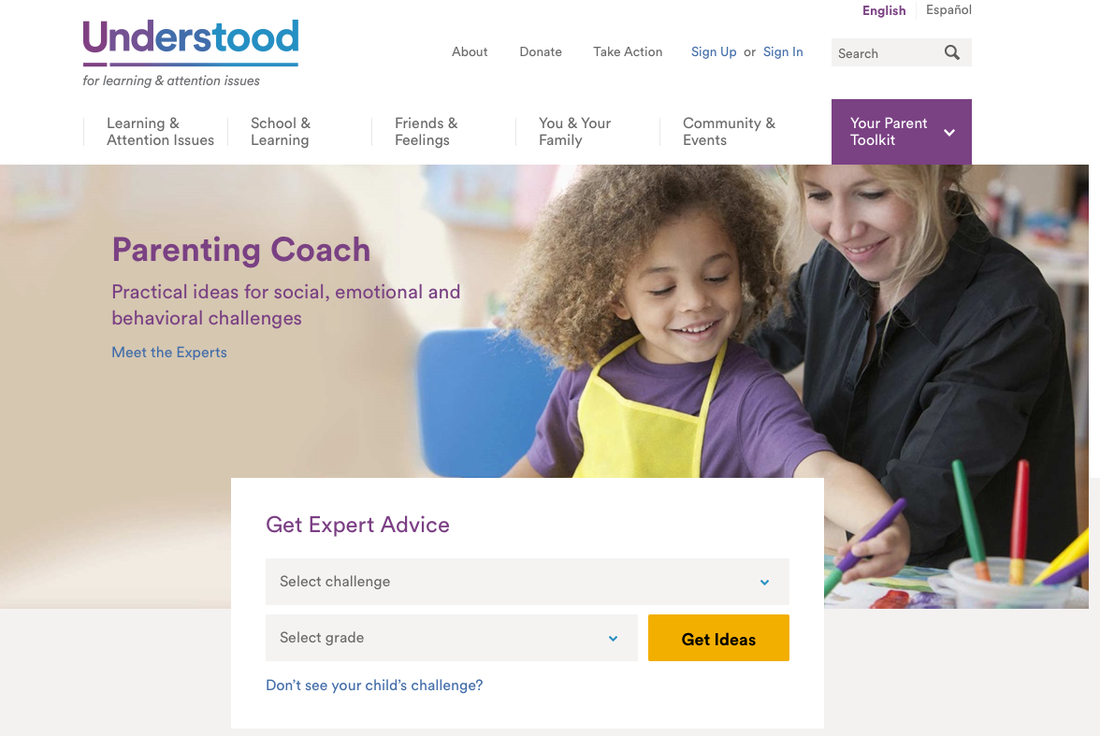 This article, When and How to Negotiate with Your Kids, from the website The Successful Parent, is a great resource for information on how to help children learn to communicate effectively. The article starts off describing why to use negotiation: "Negotiation is a valuable tool to use with your kids because helps them develop some important skills. Most notable are:
Those are good skills for kids--and adults--to learn! It's a quick and easy read, worth the time to read and definitely worth the time to learn how to do with your kids! I often recommend evaluations for children or adults who are struggling at home, work or school. I think knowing strengths and weaknesses can make a huge difference, whether you are considering asking for accommodations or just want to find out what will work best with your or your child's learning style and temperament. Here are some good articles from Understood.org and APA which will help you understand the language, options and process!
Understanding Psychological/Educational Evaluations Evaluation Terminology: Types of Special Education Evaluations Evaluations and Independent Educational Evaluation (IEE) Private Vs. School Testing for Learning Disabilities Private Evaluation: What You Need to Know Here are two great articles about how mindfulness and meditation can be used to help kids. In Pressing Pause, you learn how parents can use mindfulness practices to help kids calm themselves and avoid problematic behaviors. In the article by UpWorthy, children were taught meditation rather than being suspended! What great ideas!
 Raising kids is hard work! Ever wish you had a nice, simple list to help you figure this whole thing out? This list from The Successful Parent is just what you need! Take note that the very first and most important "tool" for managing your kid is to have a good relationship with him or her! While you're at that website, check out some of their other great articles, as well as articles in The Successful Adult! Click here for a direct link to the article: Top Ten List for Managing Your Child's Behavior. Do you have a child with learning or attention issues? Here is a great resource for advice and information from experts!
Take a look: www.Understood.org.  I like this simple video for kids to understand more about Sensory Processing problems. Sensory Processing Disorder (SPD) is not "officially" recognized, but from years of experience, I know that there are people who have difficulty with sensory issues. Take a look at this video for if you think your child might have sensory issues. There are lots of good resources online for help with this! Click HERE for Video  A new study by the National Institute of Mental Health in which hundreds of children were followed for several years, found that medication did not have a significant impact on grades in the long term. This finding was corroborated by other studies. An article in Nature poses the question, "How can medication that makes children sit still and pay attention not lead to better grades?" The answer, it suggests, may be that children develop tolerance to the drug or that while the drugs impact concentration, they do not impact intelligence and therefore as school becomes more complicated, grades do not improve. "When the MTA team examined the follow-up data, it found that many non-medical factors play a big part in whether improvements last. The best predictor of a child's response to treatment wasn't which treatment they were assigned, but a cluster of factors that were present at the start. Children with more advantages — higher intelligence, better social skills, intact families, higher parental education, fewer conduct problems or higher socioeconomic status — were likely to make big strides and hold onto them no matter what the treatment was, whereas children without these advantages typically progressed more slowly and regressed after treatment stopped.But disadvantaged children benefited when they received both medication and behaviour therapy. “The kids with the most problems needed the combination,” says Jensen, who adds that parents should have easier access to proven behaviour therapies. The effects of behavioural treatment don't seem to be longer-lasting than those of medication, however: once active treatment stops, they dissipate." What do you think? Click Here for a link to the article.  Dr. Caroline Heldman, professor at Occidental College has a lot to say about the images that we see about women and what they means to us as a society. She starts out by saying that it is a LIE that being a sex object is empowering and she goes on to prove her theory. It's very interesting! Here is a great quote from the video: "We raise our little boys to view their bodies as tools to master their environments. We raise our little girls to view their bodies as projects to constantly be improved." OUCH. Hits home. I like that she gives us a quick way to tell if an image is exploitive...and I thinks its disturbing that we don't always know! Take a few minutes to watch this and share it with your teenagers. Click HERE for the Video. We warn our daughters about dangers associated with growing up: getting pregnant, getting "used" by a boy, getting in risky situations. But what do we say to our sons? As puberty strikes, teenage boys often go inward, spending a lot of time alone or in their rooms, playing video games, listening to loud music. Those sweet little guys who used to drop into our laps and tell us how much they love us turn in to large, often uncertain, sometimes surly young men who rarely want to show us any type of real feelings. And yet, experts will tell you (and many mothers too) that young men are filled with feelings of romance and love and think just as much about finding The ONE as do their female counterparts. They just don't talk about it! But we need to talk with them, especially about how to navigate the dangers of becoming sexual. Although they can't get pregnant, they can get very hurt and they can do a lot of damage if they don't have some good strong parenting at this critical time in their lives.
Ask him some questions: What would he do if a girl started coming on to him and he didn't love her? Maybe didn't even like her but thought she was sexy? What if she was drunk? What would he do if he saw some other boys messing around with a girl who was drunk? What if it seemed like she liked it? Would it make a difference? Would he say anything? What if the boys were his friends? What would he do if a girl liked him and wanted sex with him and he wasn't ready? Does he think that if a girl had sex with him, she might be more inclined to think she was in love? How would he know she was only with him? What if she offered to send him a picture of herself without clothes? Does he know anyone who got a girl pregnant and what happened to the boy? What would he do if that happened to him? What is important to him about love? What would he do if his girlfriend made him really, really mad? Who would he talk to? There are so many questions that a boy needs to think about. He may not want to talk to you but that's OK. Ask the questions. He will think about them in his own time and and probably to some loud crazy music. But if you are very quiet and very available, he will probably come in some day and plop down and say, "You know, I was thinking about that thing you said the other day...."  Although there have been many changes in how parents feel about raising boys over the last few years, the truth is, boys still are faced with overwhelming pressure to "be tough" and to not show weakness. For boys who are by nature sensitive, it can be really hard to fit in. These boys are often targeted for bullying and, unfortunately, parents may not know how to support these children and may even make it worse for them. Dr. Ted Zeff gives us ten ways to help our sensitive boys in this article: http://drtedzeff.com/news/saving-our-sons-ten-step-plan-for-nonviolence.php |



 RSS Feed
RSS Feed
